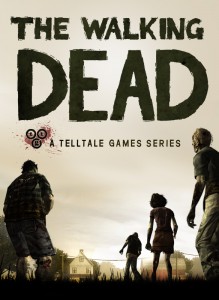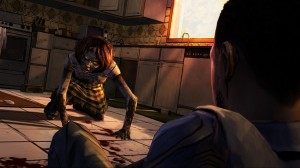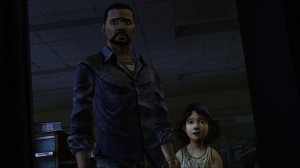 The first thing you need to know about the Walking Dead game, is that it’s less of a game and more of an interactive narrative experience. This isn’t a bad thing, necessarily, but if you’re looking for a new Left 4 Dead you’re in the wrong place. In many ways, it actually feels like a descendant of the old point-and-click games like The Dig.
The first thing you need to know about the Walking Dead game, is that it’s less of a game and more of an interactive narrative experience. This isn’t a bad thing, necessarily, but if you’re looking for a new Left 4 Dead you’re in the wrong place. In many ways, it actually feels like a descendant of the old point-and-click games like The Dig.
To be clear, as a game in the traditional sense, it’s just not terribly impressive, but that doesn’t mean it’s not worth checking out. Far from it, in fact, it’s just important to go in with the right expectations or you might be terribly disappointed. TWD gamifies your dialogue and narrative options a little like Mass Effect does. By that I mean: you have a lot of influence over the Lee Everett, the main protagonist, but he is also his own person with his own personality, so the result is a hybridized character. Based on your choices Lee can be a nice, reasonable and outgoing guy, or he can be kind of a dick.
The most interesting parts of The Walking Dead are the choices you make along the way. The implementation is a little unique, though. In a game like The Witcher, you can stare at your options and deliberate for as long as it takes. Whereas most of the time in The Walking Dead, you have a couple seconds to make your choice. This forces you to go with your gut, and leads to some very interesting situations. You will almost certainly make decisions you later regret, but not in a “Load and do over,” kind of way, but in a narratively interesting way.
 There are two game modes. One clearly indicates when you have made a potentially fateful choice or a decision that influences a character in some way—for example, “Carley will remember you trusted her”—the other keeps all those things hidden from you. It’s entirely a matter of preference, but it’s unfortunate that the latter also removes some useful UI elements.
There are two game modes. One clearly indicates when you have made a potentially fateful choice or a decision that influences a character in some way—for example, “Carley will remember you trusted her”—the other keeps all those things hidden from you. It’s entirely a matter of preference, but it’s unfortunate that the latter also removes some useful UI elements.
I’m really excited to see how my main playthrough unfolds in later episodes, because developer Telltale Games has made it clear the choices you make will continue to have repercussions long after the decision is made. During my second playthrough I went against almost every instinct I had and even though many of the choice-based changes are superficial, you actually have a lot of influence on your own experience of the game. Oh, and in case you were wondering, they are working from the comic series as canon, rather than the TV series.
To fully enjoy and experience this game, I think it’s essential to let yourself become emotionally invested and be willing to maintain your suspension of disbelief. Don’t be that guy who watches the sad part of a movie, going, “Whatev’s dude, it’s just a movie.” If you want to be that guy, I’d suggest avoiding this game.
From a technical perspective, it’s nothing to gawk over. One of the first things I noticed was the sound quality, which was surprisingly poor. The voice acting and dialogue are usually decent, sometimes pretty good, and occasionally just bad. Infrequent but inexplicable technical hiccups happen on occasion, but it’s not a bugfest. It feels like a multi-platform game, the PC version has no keybinding options, and the “Controls” setting brings up an non-customizable X360 controller diagram.
 The comic book-inspired, Borderlands-esque style was a good artistic decision and some of the characters are really well designed, but your eyes won’t be popping. Some of the zombies do look just fan-friggin-tastic, but there are some repeated model uses, and it seems like there are a few mix-and-match zombies made from scrambled parts. The animations can be pretty clunky at times, but Telltale does get a lot of emotion out of the well-crafted facial rigs.
The comic book-inspired, Borderlands-esque style was a good artistic decision and some of the characters are really well designed, but your eyes won’t be popping. Some of the zombies do look just fan-friggin-tastic, but there are some repeated model uses, and it seems like there are a few mix-and-match zombies made from scrambled parts. The animations can be pretty clunky at times, but Telltale does get a lot of emotion out of the well-crafted facial rigs.
Plan on a little over two hours of play time, maybe three if you get killed a lot and/or relentlessly pursue every single dialogue option.
Is it worth playing? I would say yes, if you like what you’ve read so far. You can grab a “season pass” for about $25, which works out to $5 an episode. I think that’s a very reasonable price for this game.
If you’re still on the fence I’ll be back with a review of Episode 2 soon.
[Connor Cleary is a video game columnist and critic, a freelance web and graphic designer, and fiction writer. He is a reviewer at GameShark and an occasional opinion and analysis columnist at Gamasutra. His freelance design business is Four Stair Multimedia and Design. You can follow Connor @The_Blue_Key, or at fb/TheBlueKey, or check out his writing archive on tumblr, The Blue Key.]